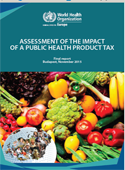Assessment of the impact of a public health product tax: Hungary (2016)

Download
The effect of the “public health product tax” (PHPT) on health and social policy was evaluated 4 years after its introduction, as review and assessment of its impact were among the tasks outlined in the national “Healthy Hungary 2014–2020” strategy. More and more countries are introducing taxes on foods to improve the diet of the population. As complex evaluations based on real data over several years are not widely available at international level, sharing the Hungarian experience could be of considerable interest. The WHO Regional Office for Europe provided financial support for this impact assessment.
The objectives of this second impact assessment of the PHPT were (i) to assess whether the impact found earlier among adults on the consumption of taxed products has been sustained, (ii) to study how consumption has changed in population groups with different health risks and socioeconomic status and (iii) to determine the economic consequences of the tax paid by companies.
The impact assessment was conducted in 2014 as part of the National Diet and Nutritional Status Survey (OTÁP 2014) of the National Institute for Food and Nutritional Science on a subsample of the population covered by the European Health Interview Survey performed by the Hungarian Central Statistical Office. In addition to this questionnaire survey, participants’ height, weight and waist circumference were measured to estimate the nutritional status of the adult Hungarian population and the prevalence of obesity and overweight. The intake of nutrients and patterns of food consumption were assessed from nutrition diaries kept by participants. The study also provided data on various health issues and on socioeconomic status. The National Tax and Customs Administration of Hungary provided data on the revenue collected from the PHPT.



